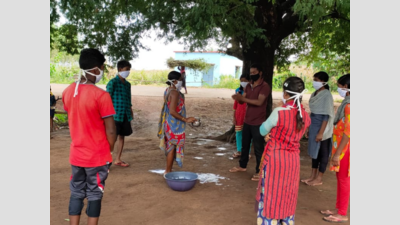- News
- City News
- bhubaneswar News
- Odisha: Community Radios help tribals to get update on Covid-19
Trending
This story is from May 21, 2021
Odisha: Community Radios help tribals to get update on Covid-19
Tribal people of some rural pockets in the state do not have exposure to several information sources, but Community Radios try to give updates on Covid-19 issues and sensitize them about the preventive steps to keep the second wave of pandemic at bay.

These radio stations have adopted 81 villages to generate awareness among communities to deliver key messages on quarantine, social distancing, use of masks, proper handwashing and to prevent misinformation.
BHUBANESWAR: Tribal people of some rural pockets in the state do not have exposure to several information sources, but Community Radios try to give updates on Covid-19 issues and sensitize them about the preventive steps to keep the second wave of pandemic at bay.
As many as 13 Community Radio stations have adopted nearby villages to keep them updated about Covid through its campaign ‘Nua Sakalara Katha’ (story of new morning) and help them to adopt the practice of using masks, maintaining social distancing and hand washing.The campaign has received support from US Consulate General Hyderabad and Young India, an NGO.
These radio stations have adopted 81 villages to generate awareness among communities to deliver key messages on quarantine, social distancing, use of masks, proper handwashing and to prevent misinformation. People of 55 out of 81 villages are wearing masks and a process is underway to ensure other villages follow the mask rules, said NA Shah Ansari, national advisor of Community Radio Association, India.
Some of these Community Radios were Radio Swayamshakti in Nuapada district, Radio Surabhi in Nayagarh district, Radio Dhimsa in Koraput district, Radio Hirakhand in Sambalpur district and Radio Upakaar in Keonjhar district. “Many hilly and tribal areas are not served by the mainstream media. Moreover, many in this district speak the local dialect and they are not confident in other languages. We broadcast content in their own language for better understanding,” said Biswajit Padhi, station CEO, Radio Swayamshakti.
Take the case of Chappar village in Koraput district. They were unaware about the government's Covid related information and precautions. After Radio Dhimsa aired programmes to raise awareness among the local community on Covid norms, tribals of this village have started following mask rules, maintaining social distance and washing their hands. “Initially it was very difficult for us to make villagers realise the need to follow Covid norms. But slowly we succeeded in our way to make them aware of these issues,” said Yasmin Lenka who works at Radio Dhimsa.
Radio Hirakhand at Sambalpur and Radio Upakaar in Keonjhar district have also aired innovative content for this purpose.
As many as 13 Community Radio stations have adopted nearby villages to keep them updated about Covid through its campaign ‘Nua Sakalara Katha’ (story of new morning) and help them to adopt the practice of using masks, maintaining social distancing and hand washing.The campaign has received support from US Consulate General Hyderabad and Young India, an NGO.
These radio stations have adopted 81 villages to generate awareness among communities to deliver key messages on quarantine, social distancing, use of masks, proper handwashing and to prevent misinformation. People of 55 out of 81 villages are wearing masks and a process is underway to ensure other villages follow the mask rules, said NA Shah Ansari, national advisor of Community Radio Association, India.
Some of these Community Radios were Radio Swayamshakti in Nuapada district, Radio Surabhi in Nayagarh district, Radio Dhimsa in Koraput district, Radio Hirakhand in Sambalpur district and Radio Upakaar in Keonjhar district. “Many hilly and tribal areas are not served by the mainstream media. Moreover, many in this district speak the local dialect and they are not confident in other languages. We broadcast content in their own language for better understanding,” said Biswajit Padhi, station CEO, Radio Swayamshakti.
The Radio Surabhi team has played a vital role in creating awareness among low-informed tribal communities in tribal villages of Nayagarh district. “During the initial phase of lockdown, the tribal people who migrated to cities for their livelihood had started returning to their native places. Our radio listeners’ group had informed the local administration about the returnees. As a result, the spread of Covid could be stopped. Innovative radio programmes were aired in local language to sensitize the tribals,” said Smita Sahoo, station-in-charge of Radio Surabhi.
Take the case of Chappar village in Koraput district. They were unaware about the government's Covid related information and precautions. After Radio Dhimsa aired programmes to raise awareness among the local community on Covid norms, tribals of this village have started following mask rules, maintaining social distance and washing their hands. “Initially it was very difficult for us to make villagers realise the need to follow Covid norms. But slowly we succeeded in our way to make them aware of these issues,” said Yasmin Lenka who works at Radio Dhimsa.
Radio Hirakhand at Sambalpur and Radio Upakaar in Keonjhar district have also aired innovative content for this purpose.
End of Article
FOLLOW US ON SOCIAL MEDIA











